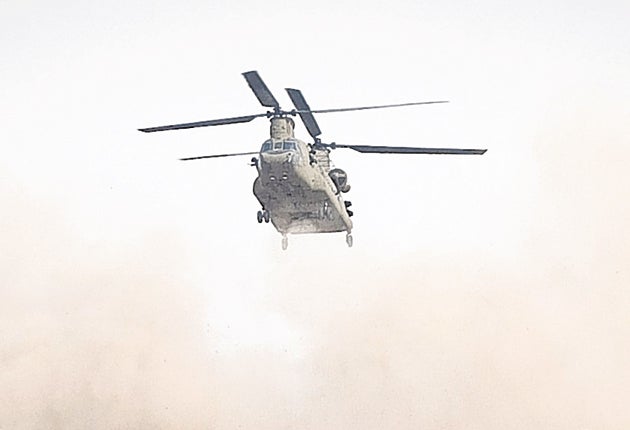US insists Chinook crash will not derail campaign

Your support helps us to tell the story
From reproductive rights to climate change to Big Tech, The Independent is on the ground when the story is developing. Whether it's investigating the financials of Elon Musk's pro-Trump PAC or producing our latest documentary, 'The A Word', which shines a light on the American women fighting for reproductive rights, we know how important it is to parse out the facts from the messaging.
At such a critical moment in US history, we need reporters on the ground. Your donation allows us to keep sending journalists to speak to both sides of the story.
The Independent is trusted by Americans across the entire political spectrum. And unlike many other quality news outlets, we choose not to lock Americans out of our reporting and analysis with paywalls. We believe quality journalism should be available to everyone, paid for by those who can afford it.
Your support makes all the difference.The Chinook helicopter that crashed in central Afghanistan, killing 30 US and eight Afghan soldiers, was rushing to help Nato troops engaged in ananti-insurgent operation targeting a Taliban leader in the area, military officials revealed yesterday.
The US-led coalition also indicated that the helicopter was struck by a rocket-propelled grenade fired by insurgent forces. Everyone on board was killed, making it the single most deadly event for US forces since the war began.
The shockwaves in the United States were felt even more deeply because among those killed were 22 Navy Seals, all but two of whom were from Team 6, the unit that found and killed Osama bin Laden in Pakistan in May, although none had actually taken part in that operation. A dog-handler and his dog also perished.
An alliance statement said: "As the insurgents continued to fire, the combined force on the ground requested additional forces to assist the operation. Those additional personnel were inbound to the scene when the CH-47 carrying them crashed, killing all on board."
The Chinook was preparing to land and unload its reinforcements when it crashed. Those soldiers already on the ground reportedly ended their engagement with the insurgents and rushed to the crash site to search for survivors, but there were none.
A Taliban spokesman, Zabiullah Mujahid, told The Independent that Taliban militants used a "weapon similar to an RPG (rocket propelled grenade)" to fell the massive chopper but would not elaborate. A spokesman for the Nato-led coalition in Afghanistan said the operation to retrieve the bodies of the 38 killed was continuing at the crash site in Wardak province, south-west of Kabul.
Nato insisted that its anti-insurgency operations would not be affected by the Chinook tragedy. German Brigadier General Carsten Jacobson, a spokesman for the coalition, said: "The incident, as tragic as it was in its magnitude, will have no influence on the conduct of operations. It was a tragic day. It was a tragic loss. The campaign is going to continue. We will continue to relentlessly pursue the enemy in the fight that we are taking to them."
In Washington, the Pentagon attempted to project the same message. "This one single incident does not represent any kind of watershed or trend," said Colonel Dave Lapan. "We still have the Taliban on the run."
The US Defence Secretary, Leon Panetta, also vowed to press ahead with the campaign against the militants. "As heavy a loss as this was, it would even be more tragic if we allowed it to derail this country from our efforts to defeat al-Qa'ida and deny them a safe haven in Afghanistan," he said.
The tragedy has inevitably triggered new soul-searching about the war in the US. President Barack Obama has vowed to pull 30,000 US troops out of Afghanistan by the end of next summer. Some will say this shows the pace of the draw-down is too swift, while critics of the war will use it to argue that the US should never have become as engaged as it has.
Join our commenting forum
Join thought-provoking conversations, follow other Independent readers and see their replies
Comments